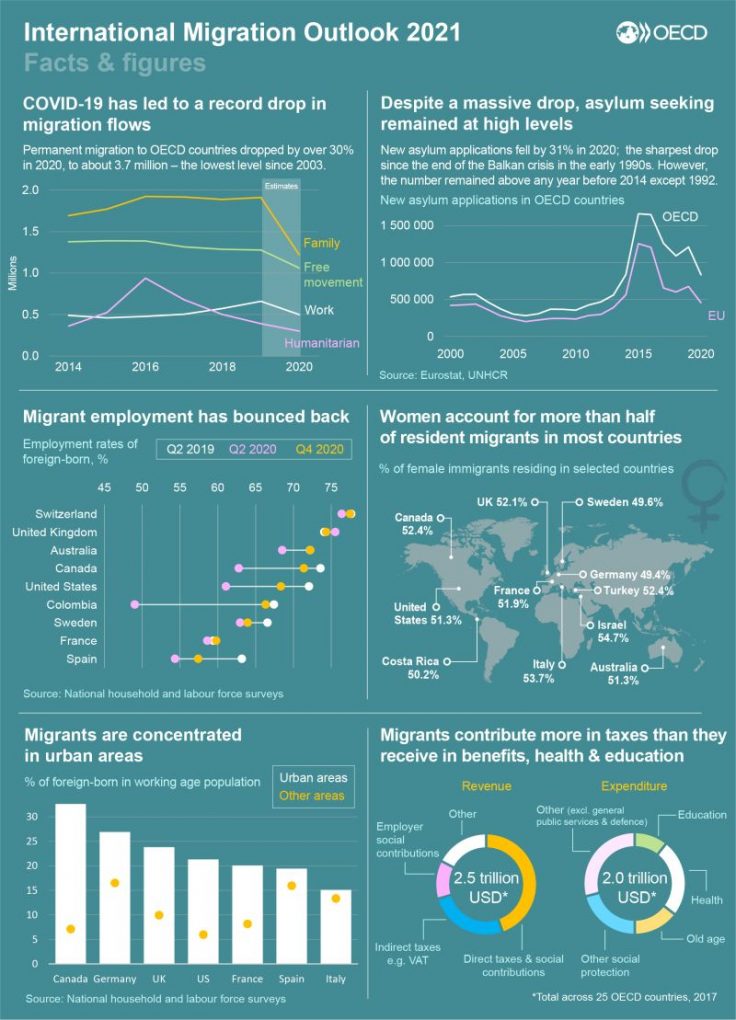The covid-19 pandemic It has significantly reduced migration flows to OECD countries, but it has also done so She spent a lot of progress for the sake of integration Accessed in those same countries. Recovery is the right opportunity to Reset policies Migration for the benefit of all. This is whatOrganization for economic cooperation and development in a International Migration Outlook 2021, presented yesterday.
I migratory flows permanent To the OECD countries decreased by more than 30% In 2020, to about 3.7 million, the lowest level since 2003. All categories of permanent immigration registered a decline, with family immigration showing the largest decline.
Humanitarian migration flows have also been severely affected, particularly to the United States and Canada. Migration for work and free movement decreased by about 24% and 17%, respectively. Temporary labor migration fell sharply, on average, by 58% and transfers within the firm by 53%.
The COVID-19 pandemic has it too It eliminated many advances in integration of migrants reached in OECD countries in the past decade. According to the OECD, governments must urgently seek comprehensive and coordinated action to prevent the pandemic from causing a permanent setback in migrant integration, which could have significant negative economic consequences and threaten overall social cohesion.
Prospects say that since the beginning of the epidemic, foreign-born workers have been disproportionately affected by job losses. The gap in the employment rate between foreign-born and baby boomers in OECD countries has widened by an average of 2 percentage points, while the difference in the unemployment rate is now more than 3 percentage points.
“The Economic recovery is a major opportunity To ensure the correct immigration and integration policy settings. Responsible pursuit of best policy practices related to immigrant integration will help us improve and enhance the strength and quality of this recovery comprehensive social cohesionOECD Secretary-General Matthias Kormann said the launch of the relationship with European Commissioner for Home Affairs Ylva Johansson.
“The OECD International Migration Outlook 2021 is an important and comprehensive overview of recent trends in international migration flows, migration policies and integration and recommendations,” said European Commissioner for Home Affairs Ylva Johansson. “Relationship helps create Solid foundation for policy making“.
A special chapter of Outlook analyzes a file in detailThe tax impact of immigration in OECD countries. Although there are differences between them, immigrants in general contribute more in taxes and contributions than they receive in health, education, and social protection. a Better immigrant integration can increase tax revenue. For example, simply closing the employment gap between immigrants of working age and citizens of the same age and level could increase the total net tax contribution of immigrants by more than a third of a percentage point of a country’s GDP.
To promote better integration, governments must Face many flaws Migrants face in labor markets and communities in pandemic recovery plans, forecasts say. This will require a broadening of the focus of integration policies and coordinated action between different policy areas, such as health, employment, education, housing and levels of government. Given the overrepresentation of immigrants among those in low-skill jobs, care must be taken to ensure that immigrants can acquire the skills needed for future jobs. This requires addressing the training gap between immigrants and indigenous peoples.
Also should pay more attention Challenges in areas of high concentration Geographical area of immigrants. Migrants tend to live in remote neighbourhoods, which tend to accumulate disadvantages, including due to poor housing and infrastructure. For newcomers, settling in neighborhoods with a strong immigrant presence often brings important benefits, but can have a long-term cost in terms of language learning and access to quality jobs. The report notes that policy should not primarily seek to prevent initial migration to specific regions, but should instead facilitate outward migration. More attention needs to be given to improving housing and promoting inclusion in areas of high concentration, particularly for immigrant women and with regard to language learning.
3

Communicator. Reader. Hipster-friendly introvert. General zombie specialist. Tv trailblazer

